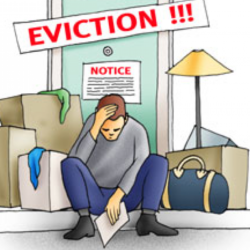










Registered with
Property118.com
Saturday 26th October 2013
Total Number of Property118
Comments:
1298
Bio
Landlord since 1997, (and from 1989 to 1992).
Set up a Housing Association in 2004, and still running this. Mainly providing supported housing to people experiencing homelessness who may have complex needs.
Worked in Citizens Advice Bureaux 1999 to 2001 (and again 2009 - 2010), as debt and benefits caseworker.
Worked in Local Government homelessness departments 2001 - 2005, and 2010.
9:58 AM, 21st January 2025, About 18 hours ago
This is presumably a big blow to the "rent to serviced accommodation" business model, as it potentially adds a 20% VAT charge onto the operators' rental income figures (which presumably would, in most cases, need to be passed on to the consumers/customers/renters).
However, does it have the same effect on owner landlords that operate their own serviced accommodation? (i.e. not leased to any middleman SA operator).... Read More
14:17 PM, 5th December 2024, About 2 months ago
Could Section 18 of the Distress For Rent Act 1737 apply in this situation?
Does it apply to corporate tenants?
Could it apply where it is the landlord that has issued notice, BUT the tenant then agreed to hand back the property?
If not applicable, then could the same argument (as per s18 DFRA 1737) be used as justification for charging mesne profits of this amount?
What does your "Forfeiture" clause say? Can this be used in this circumstance?
You need to be getting proper professional legal advice on what your remedies may be, for obtaining both possession and damages (compensation).... Read More
14:13 PM, 5th November 2024, About 3 months ago
Reply to the comment left by Lisa008 at 03/11/2024 - 13:28
No, I am not Sherwood, (or Shergroup).
We do use the services of the debt collection company, Shergroup, with the process that my post links to.
We do not offer any sort of debt collection service ourselves, but we have developed a process for instructing Shergroup to collect debts for us, (and details the stages of the debt recovery process, and the costs at each stage, if applicable).... Read More
12:16 PM, 28th October 2024, About 3 months ago
You are running a House in Multiple Occupation (HMO), so it is YOU that is responsible for paying the Council Tax, and you that is responsible for paying the utility bills (gas, electricity, water, broadband, etc). You are also the person responsible for insuring the house as a HMO, and ensuring you have permission from your mortgage lender to let the house as a HMO.
You are also responsible for maintaining the property, and this includes not just repairs and property maintenance, but also ensuring the cleanliness of the communal areas.
You also need to look at your responsibilities not just as a landlord, but as a HMO manager (the HMO regulations), as well as HHSRS and other regulations.
Hopefully you have got the mains interlinked fire alarm system and compliant fire doors throughout, and have a Fire Risk Assessment for the property.
You should also check whether the property is in an Article 4 area, or selective licencing area, and understand the implications accordingly.
I would suggest that you seek professional help from an eviction specialist that understands the HMO regulations and is able to assist you with the evictions. Then, if you still wish to be a landlord, stick to whole house (single tenancy) lets to a single household, (or a lease to a housing association or charity).... Read More
12:34 PM, 25th October 2024, About 3 months ago
Debts owed by former tenants, can sometimes be recovered, even if they are in receipt of benefits. This is our process:
https://www.dropbox.com/scl/fi/rkhu1hbx2vu09mattbzhb/CHT-Shergroup-Debt-Recovery-Process-Dec-2022.docx?rlkey=v1nr5avrci545hj0g23hczmeb&st=3dl5mx1m&dl=0
While this process doesn't work every time, overall it does seem to be an effective debt recovery strategy for rent arrears. However, you may need to have clauses in your AST or other documentation that allows this type of debt recovery.... Read More
10:33 AM, 23rd October 2024, About 3 months ago
I have a second floor flat where there were frequent reports of water leaks into the flat below. Upon invasive investigation it was found that the copper pipework had been set into the concrete floor of the flat, without any protective lagging, so that over time the acids in the concrete gradually dissolve the copper causing "pinholes" in the pipework.
This is clearly a construction defect as it is built in to the fabric of the structure.
The freeholder denied responsibility, the block management company denied responsibility, and of course I as the leaseholder of the flat also denied responsibility (as it was nothing to do with my flat itself, it was a construction fault, and the same issues were happening with other parts of the building).
After 2 - 3 years of arguing with the block management company, and temporary repairs via the block insurance policy (via the block management company), it was eventually agreed that the block management company would pay for the re-piping of the water system so that all pipework is above the flat's floor level (so would no longer be set in corrosive concrete, and pipes could be accessed without digging channels and holes into the concrete floor of the flat). - There's been no problems or leaks reported since that date (about 5 years ago).... Read More
11:35 AM, 22nd October 2024, About 3 months ago
The post didn't make it clear as to how the situation jumped from talking to the tenants, to the landlord having regained control of the property, but you have then explained to Paul Essex that you utilised the forfeiture clause to "cut out" the R2R operator.
This case does show the importance of using a proper lease agreement, which contains the forfeiture clause, for any R2R agreement, whether to a private R2R operator, or to a social landlord, charity/not for profit organisation, or local council.
Overall, a positive outcome for the individual residents, and the landlord.... Read More
11:06 AM, 20th September 2024, About 4 months ago
Reply to the comment left by Mick Roberts at 19/09/2024 - 19:12
Did any of the councils or housing associations take you up on your generous offer Mick?... Read More
14:36 PM, 19th September 2024, About 4 months ago
If they are a limited company housing association (as may be the case with smaller housing associations) then you can check their current trading status (active, dissolved, in administration, struck off, etc) on Companies House website.
If they are a Registered Provider of Social Housing (as most large housing associations are), then you can check for them on the website of the Regulator of Social Housing.
If they are a registered charity (some, but not all, housing associations may also be a registered charity), then you could check with the Charity Commission.
If the housing association is a Community Interest Company (CIC) then you could check with the CIC Regulator.
In relation to your ability to end the lease, (and the legal consequences of this), this should be stated in your lease agreement, and you may need to obtain professional legal advice on how to deal with the situation lawfully.... Read More
12:13 PM, 19th September 2024, About 4 months ago
We are a not-for-profit provider of supported housing. We lease properties from private landlords. When one of our landlords needed to sell their property at the end of our lease term they decided to sell to the Council.
We were required by the council to evict 4 residents from the property we leased, so that the council could buy the property from the owner with vacant possession.
We did ask the council to buy with the residents in situ, but they would not do this.
We asked if they would buy, and re-lease lease to us so that we could keep the residents housed and supported, but the council would not do this.
We did ask the council to rehouse our four residents, as it was the council that was requiring them to be evicted, but the council initially said they would, but then reneged on this and failed to house them.
We were left with no choice but to evict our four residents, effectively at the council's insistence (as they would only complete the purchase once the property was vacant).
At the last moment we did manage to rehouse one of the four residents, but the other three became street homeless (rough sleepers), as the council refused to even provide emergency accommodation for them.
The council now own that property, and I believe it has stood vacant ever since (from March 2023).... Read More
16:25 PM, 6th September 2024, About 5 months ago
This is not a new problem, for decades people experiencing homelessness are placed in a homeless hostel where they can receive housing and support, but when they are ready to move on into self-contained accommodation, there is simply none available.
The shortage of affordable 1 bedroom "move on" properties is a major problem for all supported housing providers (e.g. homeless hostels), and leads to the same type of "bed blocking" type issues as is encountered in hospitals. If people have nowhere to move on to, then there is no space in the hostels for other homeless people to move in to.... Read More
10:55 AM, 2nd September 2024, About 5 months ago
There are many things that the government (or government supported agencies such as TDS and Crisis and Shelter, etc) could do to improve access to the private rented sector, but they are not willing to do, and instead they "tinker" at the edges and achieve little if any positive outcomes.
Rent deposit schemes, rent in advance schemes, "renting ready" training courses, are not new, these and a myriad of other initiatives have been around for decades, and have little effect on reducing homelessness.
There is a housing shortage, and this is particularly acute for renters. Those needing or wishing to rent a home face the barriers of lack of supply and a high demand, so why would any private landlord choose to let their property to a homeless person or family, or those in receipt of benefits (Local Housing Allowance) who are usually considered to be a much higher risk?
The answer perhaps lies with reducing the risk so that it is lower risk than letting to another household. This can be done by a combination of initiatives, such as those proposed, BUT I think the most important thing that the government, local government, Shelter, Crisis, Generation Rent, et al could do would be to put their money where their mouth is and actually act as a GUARANTOR (rent AND damage guarantor) for all the households that they want the private landlords to house for them.
If government and Shelter etc really do want to house the homeless, then they need to either build or lease properties themselves and then house the people in those properties, OR act as a legally liable guarantor so that private landlords have the assurances they need to take on that risk.... Read More
11:50 AM, 23rd August 2024, About 5 months ago
The failure of councils to be able to effectively run projects that are, in effect, letting and management agents for private rented housing, is widespread and there are examples of this from around the country.
This is of course with the benefit of taxpayer money to prop up their operational costs, plus a much less regulated operating environment (should be the same enforcement criteria as for private landlords, but as councils are the prosecutors, they are obviously not going to prosecute themselves).... Read More
12:48 PM, 24th June 2024, About 7 months ago
I run a small not for profit company that leases properties in Sheffield from private landlords, for use in providing supported housing for people experiencing homelessness. We have been doing this since 2004, so have 20 years experience.
We have made mistakes along the way, but have learnt from those mistakes and improved our service offering to both the owner landlords, and also to our residents. We usually offer 6 year lease agreements at around the LHA rate for that size property, but we also provide full maintenance and repairs (non-structural), and we pay for some improvements (e.g. fire doors, fire alarm systems, electrical upgrades, etc), and we pay for the EPC, EICR, and gas safety inspections. Most of the landlords we lease from are happy to renew their lease with us time and time again.
We do see a lot of Rent2Rent operators making BIG mistakes in their set up and paperwork, which can then put the owner landlord at risk of legal consequences. However, this is much more dominant with private "for profit" R2R operators, rather than those who are genuine "not for profit" operators, as the source and security of funding is very different, and this is crucial to the level of risk.
As with all potential business dealings, it is important that each party does their own due diligence on the other party, and satisfies themselves that they fully understand the legal agreement that they are about to enter into.
Each party should ask all the awkward questions of each other, e.g. what happens if the residents don't pay, who is responsible if the drains get blocked, what happens if residents trash the house, who pays for repairs if the slates fall off the roof, what if residents refuse to leave at the end of the lease term, etc, etc.
- If you are not satisfied with the answers provided (always get the answers in writing) then walk away from the deal.
- If you are satisfied with the answers (and the due diligence on the organisation), then still tread carefully and get all documents checked by a professional legal adviser.... Read More
11:55 AM, 24th April 2024, About 9 months ago
As Rupert has said, the situation should have been discussed and negotiated prior to entering into the lease arrangement with the housing association, and the agreed terms should be stated in the lease document that you signed (or the previous owner signed, but you have taken on).
Generally speaking, there should be provision within the lease terms for the HA to hand back the property to you with vacant possession (after the agreed notice period), and if they fail to do so then what happens in this situation (e.g. continuation with a rent increase, or compensation for breach, or transfer of tenancies to you, etc).
As the first thing to do, to find out the answer to your question, you need to look at all the paperwork, particularly the lease to the HA, but also the conveyancing paperwork where such questions should also have been asked by you and your solicitor and answered by the seller via their solicitor.... Read More
12:00 PM, 23rd April 2024, About 9 months ago
The ease of getting payments from a tenant's benefits will often depend of what benefit they are receiving, any other deductions, what the payment is for, and why you are requesting the payment.
The rules regarding "Third Party Deductions" aka "Third Party Payments" are different for those in receipt of Universal Credit as opposed to those who are receiving JSA or ESA.
It can be fairly straightforward getting the TPDs for rent and service charge arrears (for JSA/ESA claimants) if there are over 2 months arrears, but more complex if under 2 months of arrears (or if it is just the "ongoing" weekly service charge you are requesting payment of).
For Universal Credit claims, it can be much more difficult. Quite often, the initial application to Universal Credit is rejected, often due to UC staff not understanding the TPD availability or process, or prioritising other TPDs (contrary to the hierarchy of priority laid down in statute and guidance), so you may need to escalate your request to an area manager or other DWP staff member that does understand how to implement TPDs.... Read More
12:08 PM, 26th March 2024, About 10 months ago
You cannot unilaterally add clauses to the tenancy agreement (AST), after the date when the AST was signed by both parties. It is important to ensure that your AST contains all the clauses needed at the outset, including any clauses relating to recovery of costs incurred.... Read More
10:39 AM, 27th February 2024, About 11 months ago
Presumably you have a copy of the original (not forged) tenancy agreement, and will have had this completed either online (so there is an audit trail for the signing etc), or you (or your agent) met with the tenant face to face and got the AST signed and witnessed? In which case you would simply rely on the original AST?
If the tenant then produces a forged AST, then what sort of things would evidence that it is forged? For example, your signature? the witness's signature? evidence of photocopying? Do you have other examples of the tenants, and witness's signatures, e.g. copy of their passport for when you did the right to rent checks?
How do you even know that the tenant has forged an AST? Have you already taken legal action and they then produced the forged document?
Have you consulted with an eviction specialist, or a specialist solicitor?
There are so many variables that I think you need to sit down with a specialist legal adviser and show them ALL the documentation.... Read More
11:05 AM, 15th February 2024, About 11 months ago
A SERCO lease is simply a "rent 2 rent" arrangement, but with the understanding that SERCO is a very large national company with huge government contracts. As Judith has already stated, you should read the lease terms very carefully as the sample lease I have seen from them is potentially very onerous on the landlord, e.g. frequency of you having to redecorate, replace kitchens, replace bathrooms, etc.
An alternative option for you may be to lease the property to a local Supported Living (Supported Housing) provider. This may be a charity, CIC, or other not for profit organisation, as they may be able to offer you better terms, e.g. https://www.dropbox.com/scl/fi/9vuqwc8lsv9m26n7xtws5/Private-Sector-Leasing-information-October-2022.docx?rlkey=vt95im8k7ng4d5lwnnpuffagn&dl=0
Disclaimer: my company is this not-for-profit Supported Living provider, (but we only operate in Sheffield, so unless your property is there then there is no vested interest).... Read More
10:16 AM, 25th January 2024, About A year ago
I believe that Section 18 of the Distress For Rent Act 1737 is still valid law (check with your solicitor) and provides you with a remedy for this situation (by way of "double rent" from the tenant). If you (or better still your solicitor) write to the tenant advising them of this remedy, and how it would affect them, I'm sure that they will more than double their efforts to move out before the end of their notice period.
You may also wish to consider serving a s21 Notice as well, and/or a s8 Notice (ground 8) if applicable.... Read More